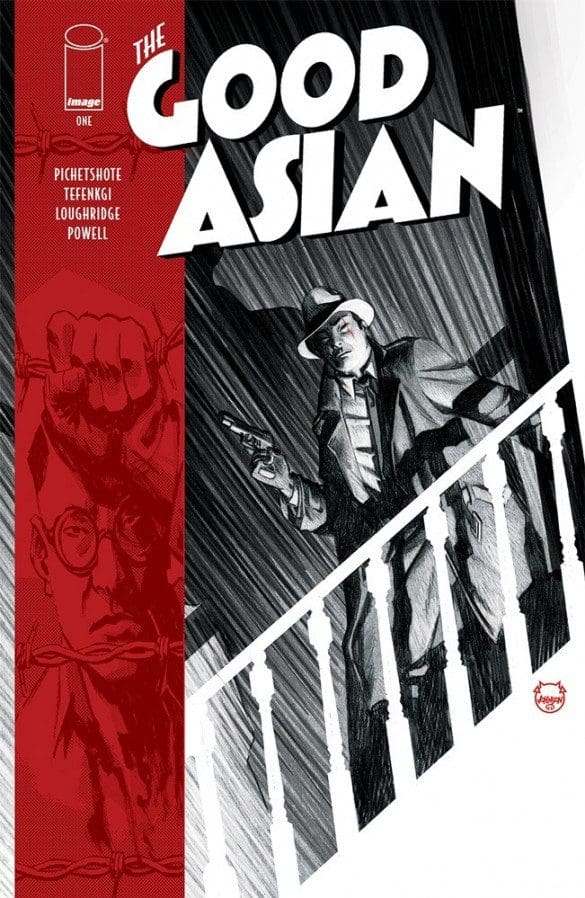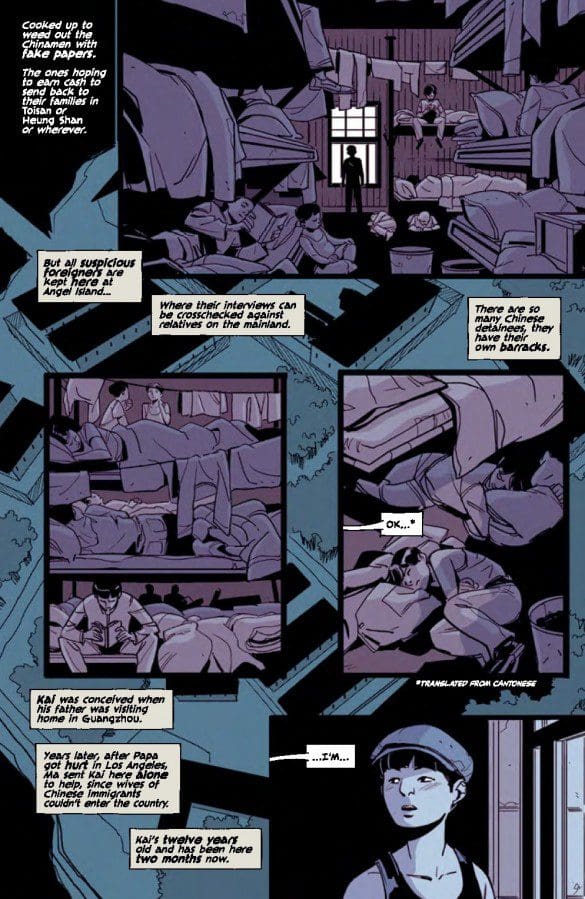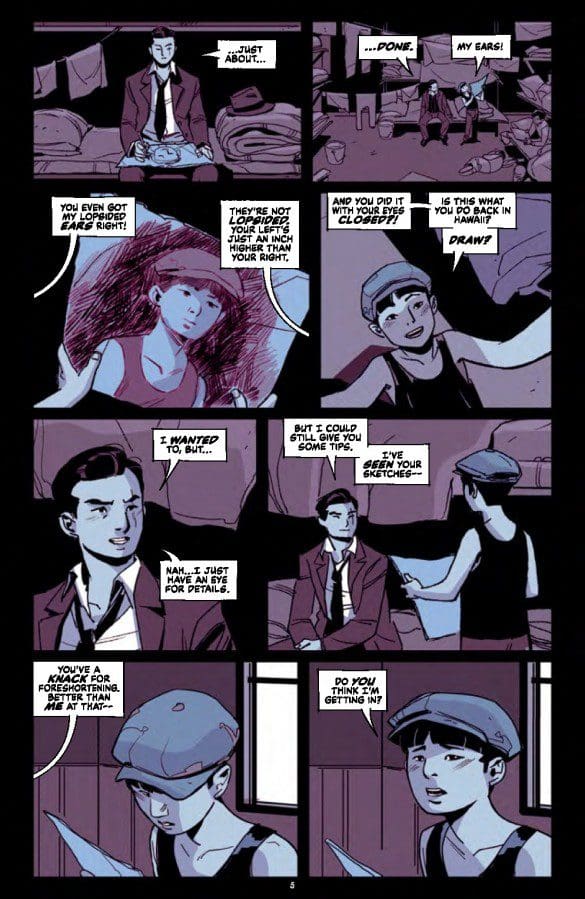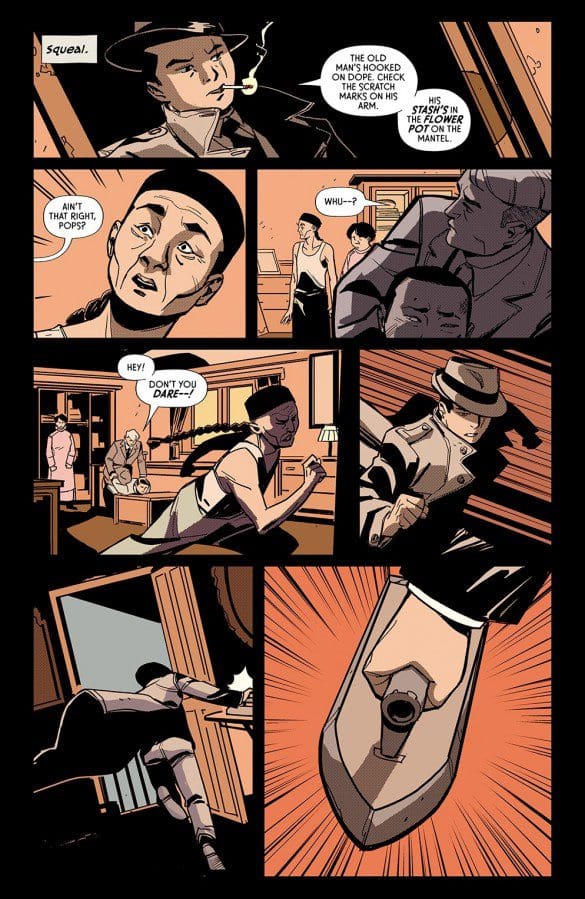From your Sam Spades to your Dick Tracys, there isn’t an archetype in Western media that conjures up a more quintessential image of straight, white American masculinity than the Private Eye. So what better archetype to explore the alienation and otheredness of the Asian-American male than the gumshoes of classic noir? In the premiere issue of the newest Image series from Pornsak Pichetshote and Alexandre Tefenkgi, this exploration is accomplished with such concision, genuineness, and palpable tension it’s clear The Good Asian is more than just a simple subversion of a subgenre, but is starting off to be a classic noir tale and worthy mandatory reading in any American history or lit class.
It’s hard to ignore the timeliness and relevance of The Good Asian, having been announced and published in a time of growing violence and bigotry towards the AAPI community due to the fear-mongering and misinformation of the COVID-19 pandemic, and notably in the aftermath of this year’s past Atlanta shooting that killed several women of the AAPI community. There is a concentrated rain cloud of history-on-repeat that permeates throughout the first issue. Set in 1936, nearly half a century after the Chinese Exclusion Act of 1882 which banned all Chinese immigrants in the wake of an economic depression (eventually extending to all Asian and Arab immigrants by 1924), we are introduced to Detective Edison Hark a Chinese-American detective from Hawaii hired to work a missing persons case in San Francisco.
The book doesn’t waste any time setting the scene, Eddie is introduced as a detainee on Angel Island, a detention center primarily for Chinese immigrants located in San Francisco Bay. He is only spared because of his badge. Eddie Hark is not only one of many to be the first generation born under the immigration ban but is the only Asian-American cop in 1930s Chinatown to boot.
However, like any great mystery, The Good Asian slowly unfolds Eddie’s psyche and tenuously pulls it in different, intersecting directions. He is a man. He is also a Chinese-American man. He is a cop. He is also an Asian cop among white cops. He is the adopted son of a white, rich affluent family. He is also the son of their maid. All the while, Edison Hark is not just some blank tokenized hero of the people or a model minority figure, he constantly struggles with his own internalized racism and at times even subscribes to it. He is not above violence, manipulation, or sex. Like his own case, readers are not meant to make heads or tails of Detective Hark right off the bat, and underneath that iconic romanticized fedora and trench coat is a deeply humanized and flawed man coming to terms with his own agency in a country that would much rather put him in a neat box or get rid of him altogether, and a community that sees him more as traitor than kin.
The overall design of The Good Asian beautifully compliments Eddie’s internalized tensions. The all-too-expected noir-ish grays and blacks coldly loom and shroud the book in mystery, but will jarringly switch to warmer yellows and oranges that convey a suffocating summer heat. Panels are asymmetrically stuffed into pages or sometimes overlap, and a visual motif that signifies Eddies’ uncanny attention to detail keeps the reader’s eye constantly scrambling for clues and looking over Detective Hark’s shoulder.
In the 2006 documentary The Slanted Screen, actor Cary-Hiroyuki Tagawa (of Mortal Kombat’s Shang Tsung fame) perfectly captures the demonstrable limited scope of the Asian-American man in Hollywood, having said “If I’m going to choose between a wimpy businessman and a bad guy, I’m gonna play a bad guy because I got balls.” Although AAPI representation in media is seemingly on the up-and-up, or at least more outwardly discussed, it comes after a generation of Asian-Americans who were denied being the heroes. They were either negatively feminized, vilified (bonus points if they were negatively queer-coded villains), or just docile mentors and generic “sensei” that only served a narrative as the companion to the oftentimes white Westerner. The Good Asian is a timely and visually bold crime thriller that weaves together a much-needed but complicated protagonist out of this generation of bleak representation, and is an assured classic entry into American noir subgenre.






Comments are closed.